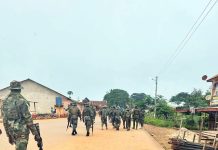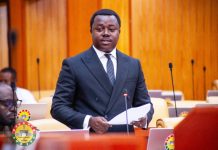The Member of Parliament for Ofoase Ayirebi and former Minister for Works and Housing, Kojo Oppong Nkrumah, has defended the New Patriotic Party’s (NPP) recent constitutional amendments, explaining that the changes are aimed at strengthening party structures and preparing the party for effective opposition not to favour any particular presidential hopeful.
Speaking on The Point of View with host Bernard Avle on Monday, 21st July, 2025 Mr. Oppong Nkrumah, who was a member of the committee that reviewed the 56 constitutional amendment proposals (54 of which were adopted), clarified that the January 2026 date set for the party’s presidential primary was not unusual nor designed to give advantage to any faction.
“There have been times when the party fixed election dates earlier than usual, especially after adjustments were made to the electoral calendar.
“The principle is that we need to contain competition early so we can get our house in order and avoid spending years battling each other,” he said.
He dismissed suggestions that the date should have been subject to a conference vote, stressing that the party’s constitution mandates the National Council, not the Conference, to set dates for internal elections.
On the controversy surrounding the expansion of the Electoral College by 40%, Mr. Oppong Nkrumah explained that while the expansion would introduce new eligible voters, some existing officers would still retain voting rights until their mandates expire in March 2026.
“The conference took a decision that until mandates expire, we shouldn’t conduct new elections at those levels,” he said, adding that this staggered approach was to ensure stability within the grassroots structures.
Polling Station
Touching on the rejected Motion 17 which sought to empower regional executives to appoint supervisors for polling station elections, Mr. Oppong Nkrumah admitted that the proposal was strongly resisted by delegates, who view polling station positions as key power bases within the party.
“They feel it’s the only control they have… and if that power is ceded upwards, they lose their influence,” he noted.
On the contentious youth age limit, the conference voted to retain the age ceiling at 40 years, despite proposals to lower it to 35.
Mr. Oppong Nkrumah argued that the decision was made to preserve the experience and leadership pipeline within the youth category, although he acknowledged the concerns of younger party members.
Mr. Oppong Nkrumah rejected claims that party elders, especially former President John Agyekum Kufuor, were being sidelined.
He attributed such claims to edited videos circulated to stoke division. “There’s not a single major decision we’ve made without consulting President Kufuor,” he said, describing suggestions of sidelining as unfounded.
Reacting to allegations that the conference stage was skewed in favor of Dr. Mahamudu Bawumia, Mr. Oppong Nkrumah insisted that the Vice President only received standard protocol as a former party leader and never engaged in open campaigning during the event.
“There’s no official campaign period now… No campaign teams have any rights at party conferences,” he emphasised.
Concluding the discussion, Mr. Oppong Nkrumah acknowledged the visible internal competition but maintained that the reforms, early elections, and tightened disciplinary measures are intended to ensure party unity and prepare the NPP for an effective role as an opposition party.
He also commended the joint planning efforts led by Joe Wise, Frank Davis and Richard Ahiagbah, stating that the conference’s overall success demonstrated the party’s commitment to self-assessment and organizational growth.










